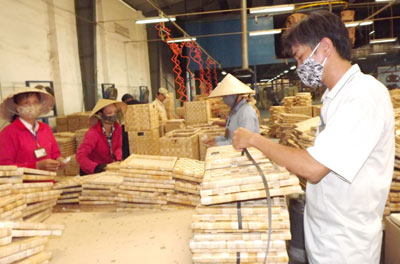
In recent years, the gender equality at work has much improved...
In recent years, the gender equality at work has much improved.
Nguyen Thi Nhung, a worker at Khanh Hoa Salangane Nest’s Company says, “All the workforce, both men and women, have the same rights and duties.
Women tend to receive more support through many special activities on the occasion of the international Women’s Day (March 8), Vietnamese Women’s Day (October 20), etc. The gender gap at work has narrowed."
 |
| More propaganda and education on gender equality are required. |
Khanh Hoa Provincial Women’s Union has made great effort in creating gender equality at work by facilitating women’s access to loans for business and ensuring women’s health and safety at work.
The association together with the Bank for Social Policies has disbursed VND 679.9 billion and the Bank for Agriculture & Rural Development, VND 84.6 billion, to poor families.
Besides 113 classes for 5,540 women on mushroom cultivation, shrimp farming and plant protection chemical use, 26 classes on household arts, including embroidery and hairdressing have been held for 1,173 women.
Job recommendation has been made for 10,596 women with an average income of VND2.5 million/month.
Under the socio-economic development program and national target projects on employment, 2011 – 2015 period, the Department of Labor, Invalids & Social Affairs has created favorable conditions for women to get loans for business expansion to improve their living standard and assure poor women benefit from poverty-alleviation policies, etc.
Trinh Thi Hop, Vice Director of the Department of Labor, Invalids & Social Affairs says, “Over the past years, state institutions and enterprises in Khanh Hoa Province have applied social welfare policies for both male and female workforce, assuring equality between men and women in employment and working conditions. The gender gap has gradually narrowed.”
However, the gender equality has still existed in some places. In fact, women suffer more from growing competitive pressures and cost-saving strategies, which can be associated with lack of security, limited possibilities for training and career advancement.
In addition, women tend to work more hours at home, compared to men and they usually take primary responsibility for family well-being. These have added to the long-lasting gender preconception, according to Trinh Thi Hop.
N.T










